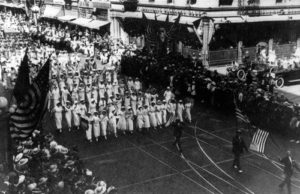This project is unique in that it focuses on women in one geographic region in order to get a clearer picture of the breadth of political work women have been doing on the ground and behind the scenes.

Nineteen ninety-two has been dubbed “The Year of the Woman,” a phenomenon in which a wave of women candidates swept local and national races for public office. California led this charge by becoming the first state in American history to be represented by two women senators—Barbara Boxer and Dianne Feinstein. And since 2016—after a presidential election that provoked heated debate about gender discrimination and sexual harassment—many women stepped up to the challenge of engaging even more visibly in the American political system. Since then, organizations like Emily’s List and She Should Run reported record-breaking numbers of women who wanted to make their voices heard by running for public office.
And yet, 1992 was not the beginning of women’s political activism, but rather the culmination of decades of organization encouraging women to get involved and run for office. For generations, Bay Area women have built the foundations of political activism that span neighborhood organizations to support networks. And their stories inform our present.
In order to document these stories, I am developing the Bay Area Women in Politics Oral History Project to record the history of these local women and their impact on and journeys through politics. The Oral History Center of The Bancroft Library at UC Berkeley continues to preserve stories about California politicians, but this project is unique in that it focuses on women in one geographic region in order to get a clearer picture of the breadth of political work women have been doing on the ground and behind the scenes. Documenting political engagement outside of traditional political venues will capture more stories about women in politics and a more diverse array of stories.
For instance, the pilot interview for this oral history project is with Mary Hughes, a Bay Area political consultant. In her interview, Hughes explained that “in politics and in political consulting, you either win races or you don’t. If you don’t win, no one hires you. If you do win, everybody wants to hire you.” Hughes’s successful career in the Bay Area spans decades and highlights the prominence of women in national politics. And though she does not wish to run for office herself, Hughes sees her role as someone who can best serve her community by managing the election process for political candidates—especially other women. Hughes’s recollections are an example of the kinds of stories that will drive this oral history project.

These long-form oral history interviews survey Bay Area political women’s backgrounds in and passion for political work through self-reflection. This format allows for comparisons between various avenues of political activism—like organizers and elected officials. It also reveals the importance of networks and mentors, and the impact they have had on women in the Bay Area political scene.
As engaged citizens, we need to know more about these women who helped create a space for themselves in Bay Area political life. Who are these women and what are their stories? From neighborhood organizations to national campaigns, what is the range of political activism in which these women engage? How has being a woman been a challenge or an asset to their political involvement? How have these women been working in the background of political life for generations? How does living and working in California affect political opportunities? What kind of political power do these women wield locally and nationally?
As we approach the hundredth anniversary of women’s suffrage, conducting oral histories with women activists and politicians in California’s San Francisco Bay Area will help shape the national narrative about women’s historic, current, and future roles in American political life. Further, gathering firsthand stories will help inspire and instruct a new generation of politically engaged women.
In addition to collecting primary source materials, The Oral History Center shares its collection with the general public through interpretive materials—like podcasts—and educational initiatives. Recording the contributions of these impressive Bay Area women—political fundraisers, organizers, and elected officials—through life history interviews is the first step in developing curriculum for workshops that cultivate young women’s political leadership. These workshops will use oral histories as a tool to foster civic engagement across the political spectrum, as well as to help develop confidence and skills of future women leaders. We also plan to create a podcast, a series of public forums, and a museum exhibit featuring these interviews.
We are currently raising funds for this project, and need your help to undertake the expansion of this ambitious oral history collection. You can support this project by giving to the Oral History Center. Please note under special instructions: “For the Bay Area Women in Politics Oral History Project.” To learn more about this project, please contact Amanda Tewes at atewes@berkeley.edu or 510-666-3687.
Amanda Tewes is an interviewer with The Oral History Center and specializes in California history and political culture.
The Oral History Center is a research program of the University of California, Berkeley. The OHC helps preserve contemporary history by conducting carefully researched video recorded and transcribed interviews. As part of UC Berkeley’s commitment to open access, archival copies of the audio/video and transcripts are placed in The Bancroft Library and are publicly accessible online.